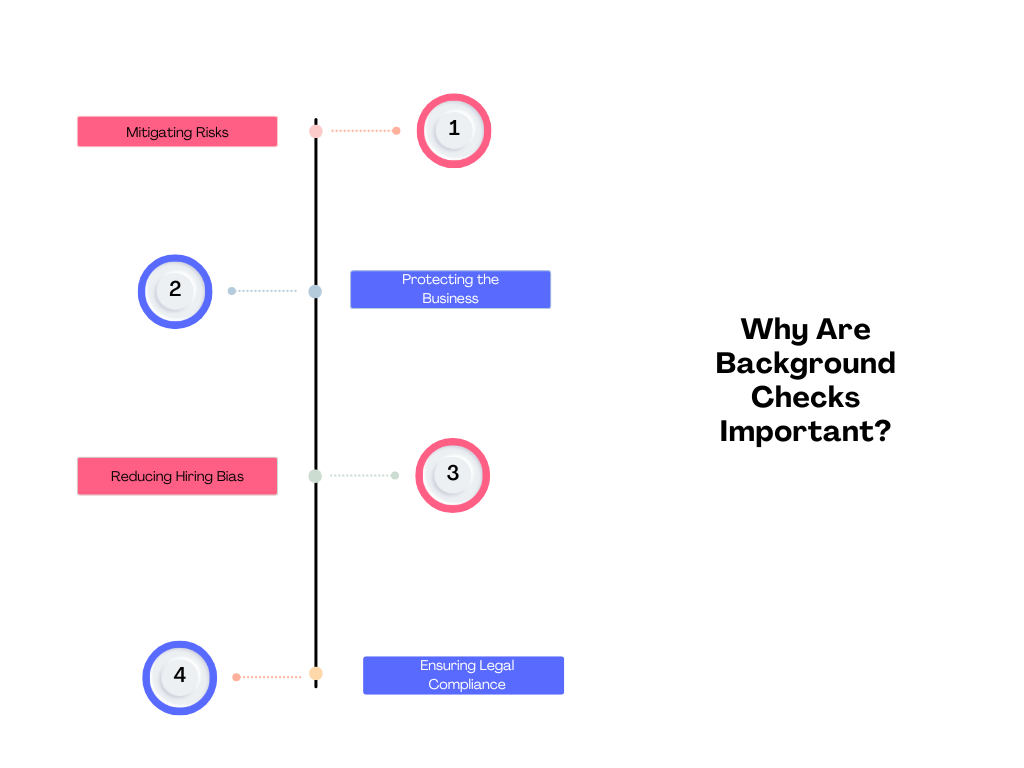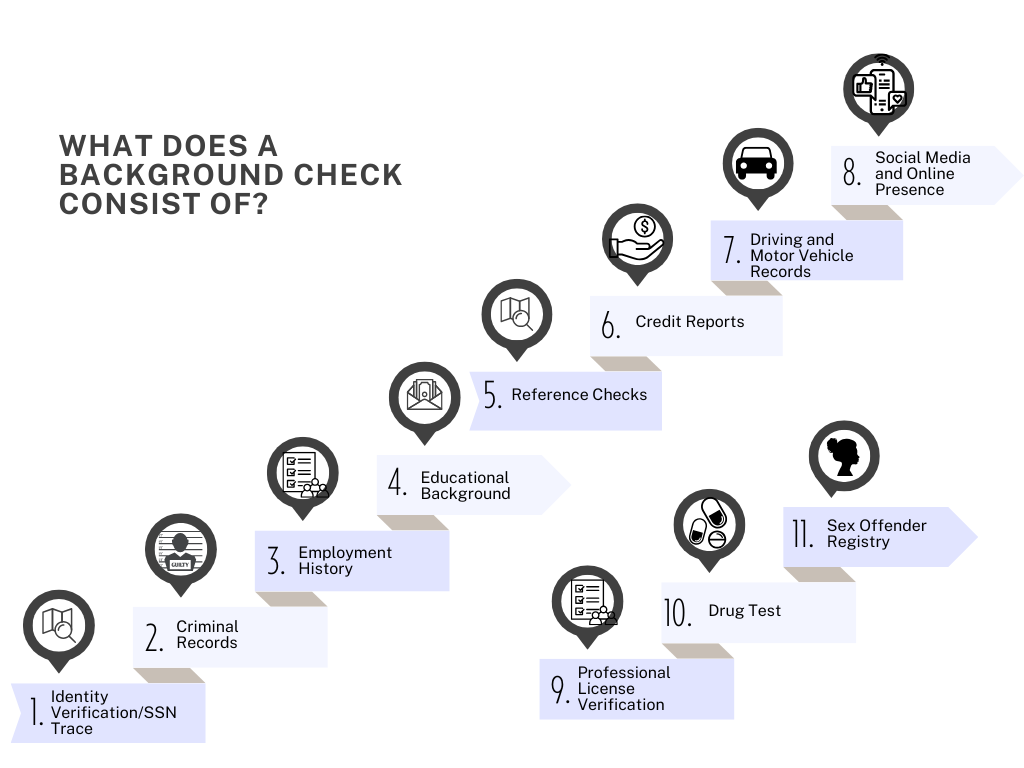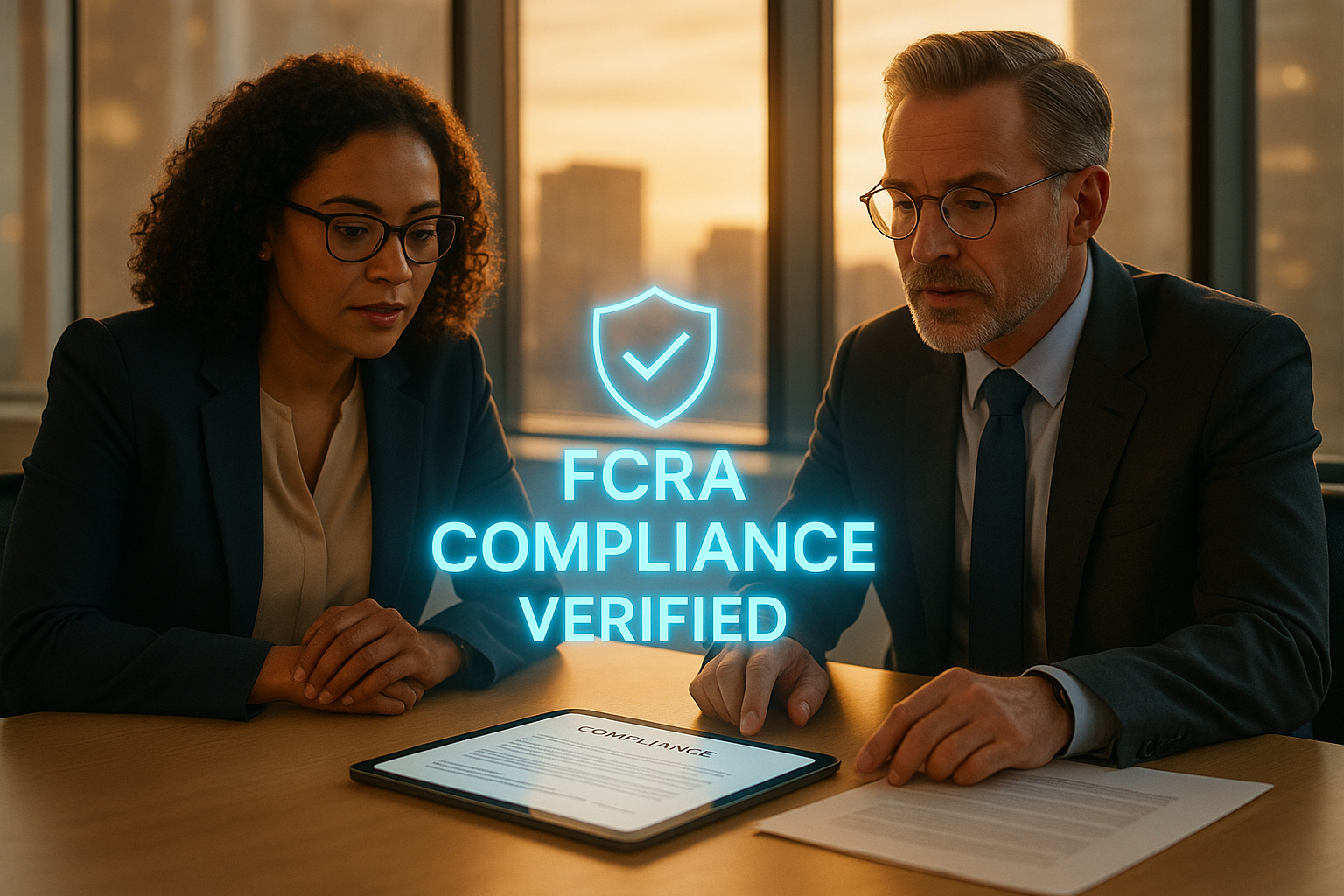What Does a Background Check Show and Include?

Background checks are important tools used by employers to assess the qualifications and suitability of candidates for a job. These checks provide a deep look into various aspects of a candidate’s background to ensure they align with company standards and are not a potential risk.
It is important for businesses to understand what these checks entail and how they can help in making informed decisions.
By using tools like Social Media Background Screening and Background check with AI with Ferretly, employers can improve their hiring processes, ensuring accuracy, compliance, and a better understanding of their candidates.
What is a Background Check

A background check is a process through which employers verify a candidate’s history to ensure that they are the right fit for the job and the organization. This process typically includes looking at the candidate’s criminal record, employment history, education, and sometimes financial and driving records.
Most background checks have a lookback period of 7 years. However, there are several factors that determine how far back a background check can go. These factors can include the type of job, local laws, and the nature of the offenses involved. While a 7-year period is standard, certain crimes or information may be included for a longer duration based on their relevance to the job.
It is important to note that background checks are part of the pre-phases of the hiring process, helping to screen potential employees for a variety of factors that may impact their performance or suitability for the job. For further information on the importance of this phase, employers can refer to resources like Screening Potential Employees.
Why Are Background Checks Important?

Background checks play a critical role in ensuring that employers hire trustworthy, reliable candidates. Here are several reasons why they are important:
- Mitigating Risks: Background checks help identify any past criminal activity or other behaviors that may pose a risk to the workplace. For instance, through Social Media background Screening, employers can better assess the behavior and attitudes of candidates that could affect the workplace environment.
- Protecting the Business: By performing thorough background checks, companies can avoid hiring individuals with a history of fraud, violence, or other negative behaviors that could harm the business's reputation or operations. Using background check tools with AI can improve the accuracy and efficiency of identifying such risks.
- Reducing Hiring Bias: One of the key advantages of modern background check systems, like AI-powered solutions, is that they help reduce hiring bias. This ensures that hiring decisions are made based on objective factors rather than subjective judgments, promoting fairness and diversity in the workplace.
- Ensuring Legal Compliance: Employers must ensure that their hiring practices comply with local laws and regulations. A well-executed background check process helps ensure that the company follows legal standards, including compliance with the Fair Credit Reporting Act (FCRA) and other relevant laws.
It helps businesses protect themselves from potential risks, ensures compliance with the law, and contributes to creating a safer and more productive workplace.
What Shows Up on a Background Check
A background check can reveal various aspects of a candidate’s history, helping employers assess potential risks. Criminal records often show past convictions for felonies or misdemeanors, though not all offenses are relevant to every role.
Employers must also be aware of laws regarding how criminal records are used. For more details, check out what causes a red flag on a background check. Pending charges may also appear, though they don't constitute a conviction until resolved.
Employment history verification is important, as it confirms job titles, employers, and dates of employment. With 78% of job seekers admitting to lying during the hiring process (CNBC study), employers need to ensure claims are accurate to avoid misrepresentation.
What Does a Background Check Consist Of?

A comprehensive background check typically consists of several different components. These components vary depending on the position, location, and company requirements. Below are the key elements that make up a background screening.
1- Identity Verification/SSN Trace
Identity verification is one of the first steps in the background check process. This part helps confirm that the person applying for the job is who they claim to be. With identity theft on the rise, this step is critical in preventing fraudulent job applications. 15.4 million consumers were impacted by some type of identity theft, emphasizing the importance of verifying identity.
2- Criminal Records
Checking criminal records is a core component of any background check. Employers need to ensure that their potential employees do not have a criminal history that could negatively affect the workplace. This can include felonies, misdemeanors, and sometimes even arrests. However, employers should always ensure compliance with local laws, as the Fair Credit Reporting Act (FCRA) regulates how this data is used.
3- Employment History
As mentioned earlier, verifying employment history is crucial in confirming that the candidate has the qualifications and experience they claim. This check also helps ensure that the applicant has no gaps or inconsistencies in their job history. Many candidates may lie about their employment background, so verifying this data is a crucial step in the hiring process.
4- Educational Background
Education verification is another standard part of a background check. Employers want to ensure that candidates have completed the education they claim, such as degrees or certifications. This helps guarantee that candidates are qualified for the position.
5- Reference Checks
Reference checks provide valuable insight into a candidate's performance, behavior, and interpersonal skills. Employers typically contact previous employers or personal references to verify how well the candidate worked in a team or whether they were reliable.
6- Credit Reports (For Specific Roles)
For some roles, especially those involving financial responsibilities, employers may check an applicant’s credit report. A poor credit score may not disqualify a candidate outright, but it can give insight into their financial management and trustworthiness, especially in roles related to finance or accounting.
7- Driving and Motor Vehicle Records (If Relevant)
For positions requiring driving, such as delivery drivers or truckers, employers will check the candidate’s driving record. This ensures that the person has a valid driver’s license and a safe driving history.
8- Social Media and Online Presence
Social media checks are becoming increasingly common in background checks. By reviewing a candidate’s social media activity, employers can get a clearer picture of the candidate’s character and whether they align with company values. Employers can evaluate aspects such as professionalism, behavioral tendencies, and even instances of inappropriate behavior. For more on how these checks can help, refer to our article on social media background check benefits.
9- Professional License Verification
For certain roles, verifying that candidates hold the necessary professional licenses is crucial. This ensures that the person is qualified and authorized to perform specific tasks or duties within their profession.
10- Drug Test
Drug tests are often included in background checks for positions that require safety or operational integrity. This is particularly important in industries like transportation, construction, and healthcare, where drug use could put employees and others at risk.
11- Sex Offender Registry
Employers may check the sex offender registry to ensure that the candidate does not have a history of serious offenses. This is especially important for positions where the employee will interact with vulnerable populations, such as children or the elderly.
What Shows Up on a Background Check for International Candidates?
When conducting background checks for international candidates, employers must consider a range of factors that can differ significantly across countries. Here's a look at the key areas that may show up:
- International Criminal Records: Employers may search for criminal history in the country where the candidate has lived or worked. However, retrieving these records can be more complex due to varying laws and access to information.
- Global Criminal History: A global search might include information from multiple countries where the candidate has resided, though this depends on international cooperation and data-sharing agreements.
- Interpol and Global Databases: Interpol and other international law enforcement agencies may provide criminal history information across borders, offering employers insight into potential criminal behavior beyond their country's jurisdiction.
- Regional Variations: Each country has its own laws and procedures regarding criminal records, which means what is available may vary based on the region. In some countries, criminal records may be sealed, making them unavailable to employers.
- International Employment History: Verifying a candidate’s employment in different countries can be challenging due to inconsistent record-keeping standards across nations.
- Employment Verification: Employers can verify employment history abroad through references or official documentation, but in some countries, verification may require third-party services.
- Third-party Verification: Global employers often use third-party companies to help verify a candidate’s international employment history, education, and other relevant details.
- Education Verification: Confirming educational qualifications for international candidates can be difficult, particularly when dealing with foreign degrees or non-standard educational systems.
- Foreign Diplomas and Degrees: Verification of foreign diplomas may be handled by specialized agencies that evaluate educational credentials.
- Educational Accrediting Bodies: Employers often rely on recognized international accrediting bodies to ensure the authenticity of foreign degrees.
- International Credit Reports (Where Applicable): In some countries, credit history may be checked, though not all countries provide credit reports for international candidates.
- Availability of Credit Reports: The availability of international credit reports depends on the country’s data protection laws and credit reporting systems.
- Country-Specific Credit Reporting: Different countries have distinct credit reporting systems, and some may not offer credit reports to foreign employers.
- Verification of Professional Licenses: Some professions require licenses, and verifying these licenses across countries can be challenging.
- Regulated Professions: Professions like medicine, law, and accounting may require specific licenses or certifications that can be verified internationally.
- License Validity Across Borders: Verifying whether an international professional license is valid in another country may require consultation with relevant licensing bodies or legal experts.
- Social Media and Online Presence: Social media screening is becoming more common, even for international candidates. Employers may look for clues about character or behavior through a candidate’s online presence.
- Social Media Screening: Screening social media profiles can reveal valuable insights, but employers need to be cautious to avoid violating privacy rights.
- Cultural Sensitivity: Employers should consider cultural differences when interpreting social media posts or online activity, as certain behaviors may be viewed differently across cultures.
- Language Verifications: If a candidate claims proficiency in a language, it may be necessary to verify their language skills, especially if the role requires fluency in a specific language.
- International Regulatory Compliance: Employers must ensure their background checks comply with international laws, which can vary significantly by region.
- Data Protection Laws: Different countries have strict data protection laws, so it is essential to ensure compliance with local regulations regarding privacy and data collection.
- Consent Requirements: Employers must obtain proper consent from international candidates before conducting background checks, as required by the laws in the candidate’s home country.
- International Driving Records (If Relevant): If driving is part of the job, international driving records can be checked, but availability varies by country.
- Driving History: Similar to criminal records, driving history checks are dependent on the country’s record-keeping and data-sharing policies.
- Country-Specific Requirements: Each country has specific rules regarding the types of information that can be checked, how it can be obtained, and the processes for verification.
What Are the Different Types of Background Checks?
Background checks come in various forms, each designed to provide employers with specific insights about a candidate. Here are some of the common types:
- Criminal Background Check: This check reveals any past criminal history, such as convictions or arrests. It is one of the most common background checks used by employers.
- Employment Background Check: Employers use this check to verify past employment, including job titles, responsibilities, and dates of employment.
- Education Background Check: This check ensures that the candidate's educational claims are accurate, including confirming degrees and certifications.
- Credit Background Check: For roles that involve financial responsibilities, employers may check the candidate’s credit history to assess financial reliability.
- Driving Record Check: This check is used to verify a candidate’s driving history, especially for roles requiring travel or operating vehicles.
- Social Media Background Check: With the rise of online activity, many employers now screen candidates’ social media profiles to assess their behavior and personality. Pros and Cons of employers checking social media.
- Identity Verification Check: This check confirms the candidate’s identity, often through a Social Security Number (SSN) trace, to prevent identity fraud.
- Professional License Verification: For jobs that require a specific professional license (e.g., doctors, lawyers, etc.), employers verify the validity and status of the candidate's license.
- Tenant Background Check: This type of check is used by landlords or property managers to verify a prospective tenant’s criminal, rental, and financial history.
- International Background Check: This check is for candidates with international backgrounds, covering criminal records, employment history, and education verification from other countries.
- Drug Screening: Employers may require candidates to undergo a drug test to ensure they are drug-free before being hired, especially for safety-sensitive positions.
- Security Clearance Check: For government positions or jobs requiring access to classified information, a security clearance check is necessary.
By understanding these different types of checks, employers can make more informed decisions about potential hires and ensure they select candidates who are suitable for the role.
For further reading on the various types of checks, visit our guide on background check types.
What Jobs Require Extensive Background Checks?
Certain industries require extensive background checks to ensure safety, security, and trust. These checks are necessary due to the sensitive nature of the work involved. Here are key sectors where thorough background checks are common:
- Healthcare: Positions in healthcare involve access to patients and sensitive medical data. Background checks verify criminal records, licensing, and education to ensure patient safety.
- Finance: Jobs in banking and finance require extensive background checks to identify any history of fraud, embezzlement, or financial misconduct.
- Education: Teachers and school staff undergo rigorous checks to protect children and confirm credentials. This includes verifying past employment, education, and criminal history.
- Government and Security: Roles involving national security, law enforcement, or classified information often require comprehensive background checks and security clearances.
For more information on best practices in employment checks, visit The Do's and Don'ts of employment background checks.
Why Do Employers Use Background Checks?
Employers use background checks to mitigate risk, ensure workplace safety, and verify candidate qualifications. These checks help employers make informed hiring decisions by uncovering potential issues like criminal records, falsified employment history, or financial misconduct. Implementing thorough background checks can protect a company's reputation and reduce the risk of liability.
To learn more about how to effectively conduct a background check, check out our detailed guide.
How Long Does a Background Check Take?
The time frame for a background check can vary based on the type of information being verified and the sources involved. Typically, a standard background check takes anywhere from 1 to 5 business days. Factors like the complexity of the check, delays in accessing records, or the need for international verifications can extend this period.
Legal and Ethical Considerations
When conducting background checks, employers must navigate legal and ethical boundaries to avoid discrimination, protect privacy, and comply with regulations. The Fair Credit Reporting Act (FCRA) outlines rules for obtaining and using background check information.
Additionally, candidates must provide consent before a check is conducted, and employers must be transparent about how the data will be used. Adhering to ethical practices ensures fairness in hiring and avoids potential legal challenges.
Ferretly follows all federal and state/provincial laws when it comes to pre-employment social media screening and protecting your data. This includes FCRA, EEOC, GDPR, and DPF.
How to Prepare for a Background Check?
Preparing for a background check can help streamline the process and ensure there are no surprises. Here are key steps to get ready:
- Understand the Purpose of the Background Check: Know what type of information the employer is seeking and how it applies to the role.
- Review the Past Records of Employee: Check your own records, such as employment history, criminal records, and credit reports, for accuracy.
- Address Potential Red Flags: Identify any issues that might raise concerns and prepare to explain them honestly.
- Gather Supporting Documents: Collect necessary paperwork, such as educational certificates, employment records, and identification documents.
- Inform Your References: Notify your professional references in advance so they are prepared to respond promptly.
- Be Transparent During the Process: Disclose relevant information upfront to build trust with your potential employer.
- Know Your Rights: Familiarize yourself with laws governing background checks, like the Fair Credit Reporting Act (FCRA).
- Monitor the Timeline: Track the progress of your background check and follow up if delays occur.
- Review Online Presence: Clean up your social media profiles to ensure they reflect a professional image.
- Seek Professional Help if Necessary: If there are complex issues, consider consulting professionals who specialize in background checks or legal advice.
What Happens After a Background Check?
Once a background check is complete, the employer reviews the results to determine if the candidate is a good fit. If no issues are found, the hiring process proceeds smoothly. If potential concerns arise, the employer may:
- Discuss Red Flags: Candidates might be given a chance to explain any discrepancies or concerns.
- Make a Hiring Decision: Based on the results, the employer decides to hire, reject, or offer conditional employment.
- Provide Adverse Action Notice: If a candidate is rejected due to the background check, the employer is legally required to provide a notice, a copy of the report, and a summary of rights under the FCRA.
The Role of Social Media in Modern Background Checks
Social media has become a crucial element of modern background checks. It allows employers to gain additional insights into a candidate's behavior, values, and professionalism. Social media screening can reveal:
- Professional Image: Whether a candidate's online presence aligns with company values.
- Behavioral Red Flags: Evidence of inappropriate content, discriminatory remarks, or unprofessional behavior.
- Verification of Claims: Cross-referencing information like employment history and accomplishments.
However, ethical and legal considerations are essential when using social media screening. Employers must ensure they comply with privacy laws, avoid bias, and apply consistent screening policies. For more information, read about the Pros and Cons of employers checking social media.
Ferretly offers AI-powered Social media screening and background checks solutions that simplify and enhance the hiring process. Our platform conducts comprehensive background checks, ensuring all relevant data is considered.
By using AI, we provide faster processing times and reduce human error, enhancing accuracy and reliability. Ferretly's customizable solutions allow businesses to tailor screenings to their specific needs, while the user-friendly interface ensures smooth navigation for HR teams.
Continuous monitoring keeps employers updated on any changes to candidate backgrounds after the initial screening.
Frequently Asked Questions
1- How Far Back Does a Background Check Go?
The standard lookback period for a background check is typically 7 years, though it can extend further based on state laws, the type of check, and the role. Some states allow checks to go back 10 years or more for positions in sensitive industries like healthcare or finance. Learn more in our guide on background check lookback periods.
2- How To Choose a Background Check Company?
When selecting a background check company, consider factors like accuracy, compliance with regulations (such as the FCRA), turnaround time, and cost. Look for providers who offer comprehensive services and have strong customer reviews. Choosing a company that incorporates AI can enhance efficiency and reduce errors. Discover more about background check types.
3- Can Employers See Employee Work History?
Yes, employers can verify a candidate's employment history, including previous job titles, employers, and dates of employment. However, they may not see detailed job performance unless they request references. To understand more, read our article on conducting employment background checks.
4- What Will Happen if a Red Flag Shows Up on My Background Check?
If a red flag appears on your background check, employers may reach out for clarification before making a decision. Depending on the nature and relevance of the issue, it could lead to rejection, conditional offers, or acceptance. For more details, explore our article on identifying red flags on background checks.
5- What Are the Factors Affecting Background Check Accuracy?
Several factors can impact the accuracy of background checks, including incomplete records, human error, name variations, and outdated databases. To ensure accuracy, reputable companies cross-reference multiple sources and utilize advanced tools like AI. Learn more about how AI improves background check accuracy.
6- Does a Background Check Show if You've Been Fired or Quit?
Background checks typically do not show the specific reason for leaving a job. However, employment verification may reveal dates and job titles, and references might disclose this information. For details on verifying work history, read about employment background checks.
Conclusion
Understanding what a background check entails, how to prepare for it, and what employers seek helps you navigate the hiring process confidently. Whether you’re an employer or a candidate, being informed ensures transparency, accuracy, and fairness in the screening process. For further guidance, explore our detailed resources on background checks, AI integration, and ethical hiring practices.






